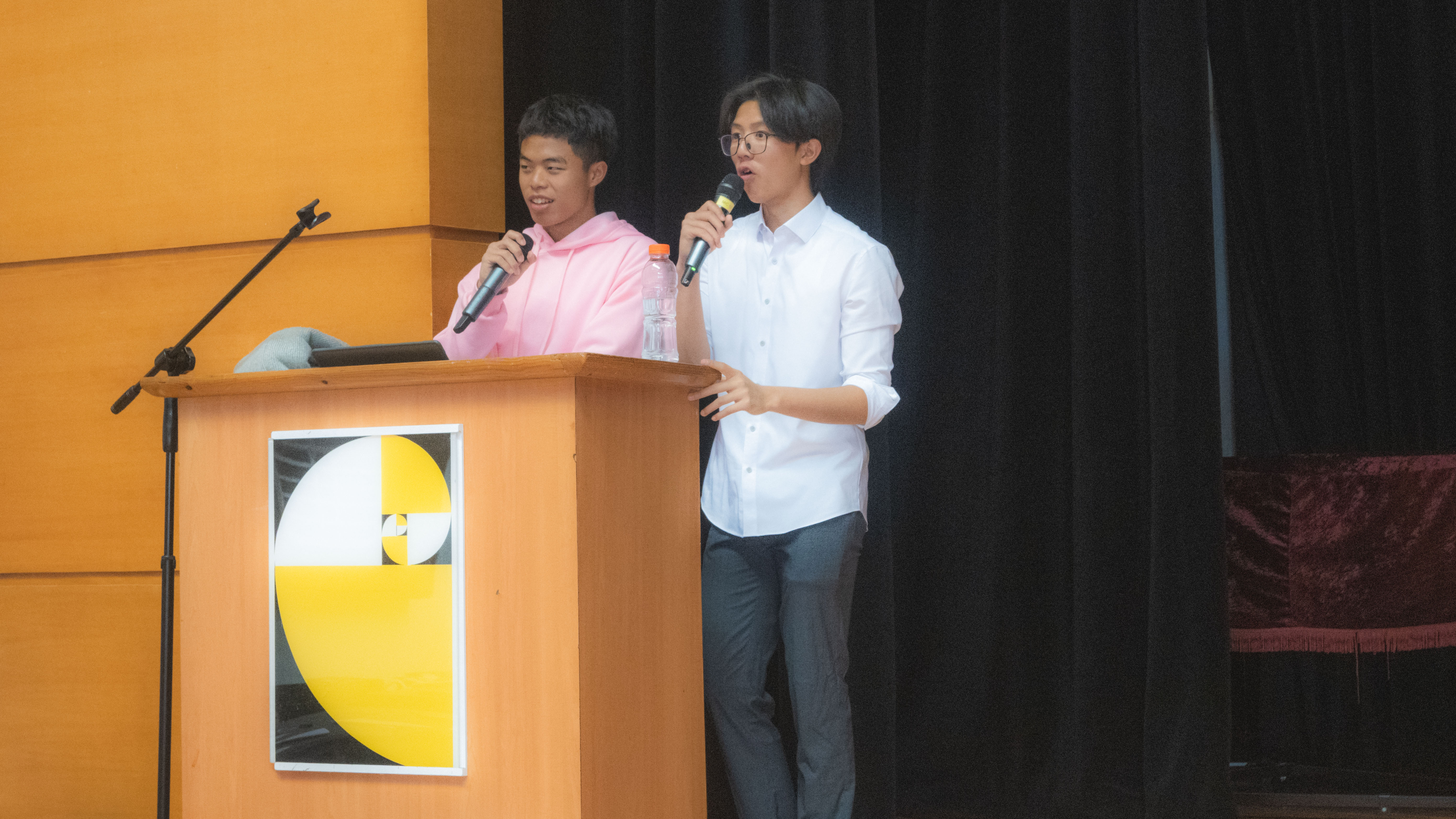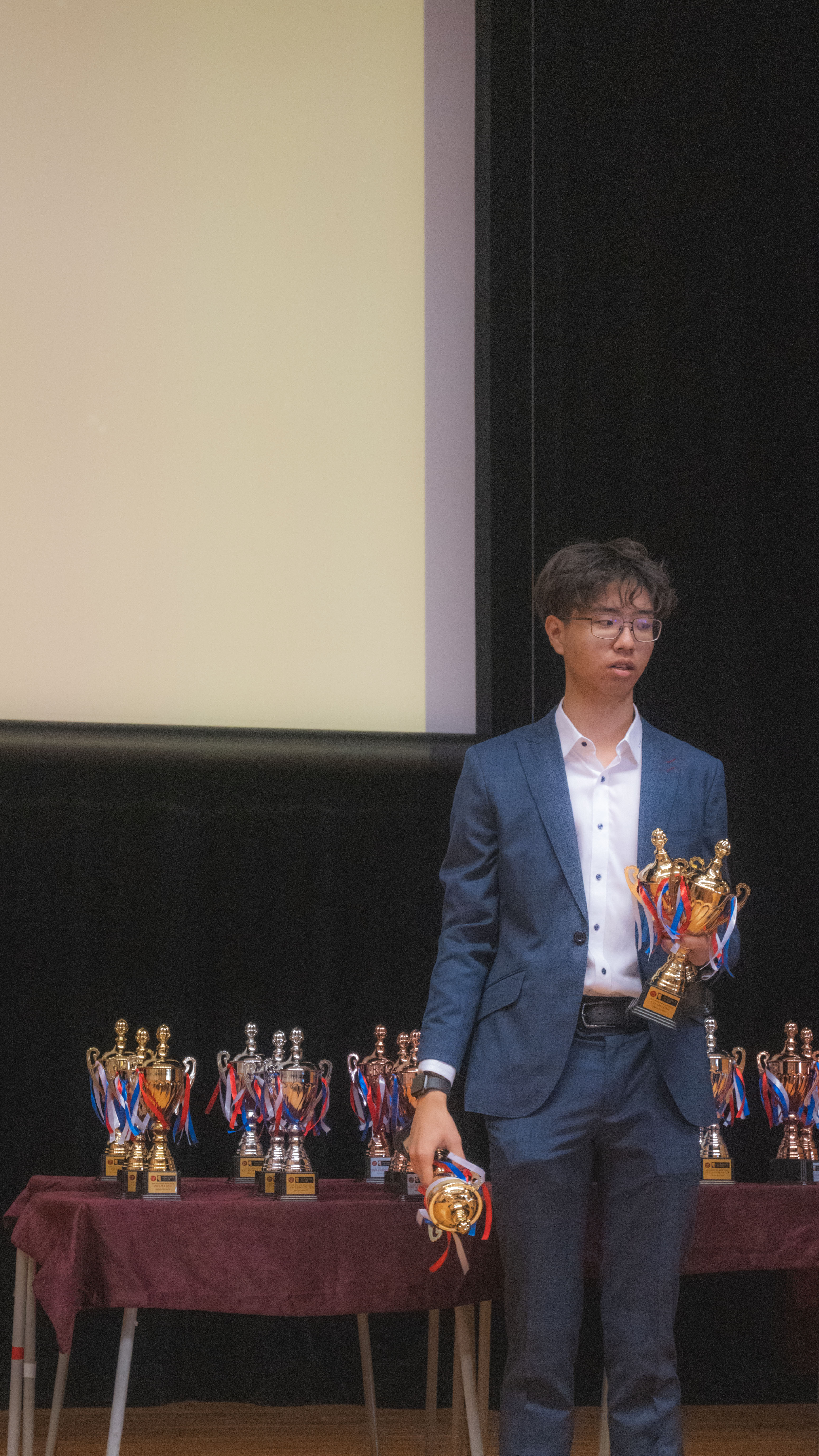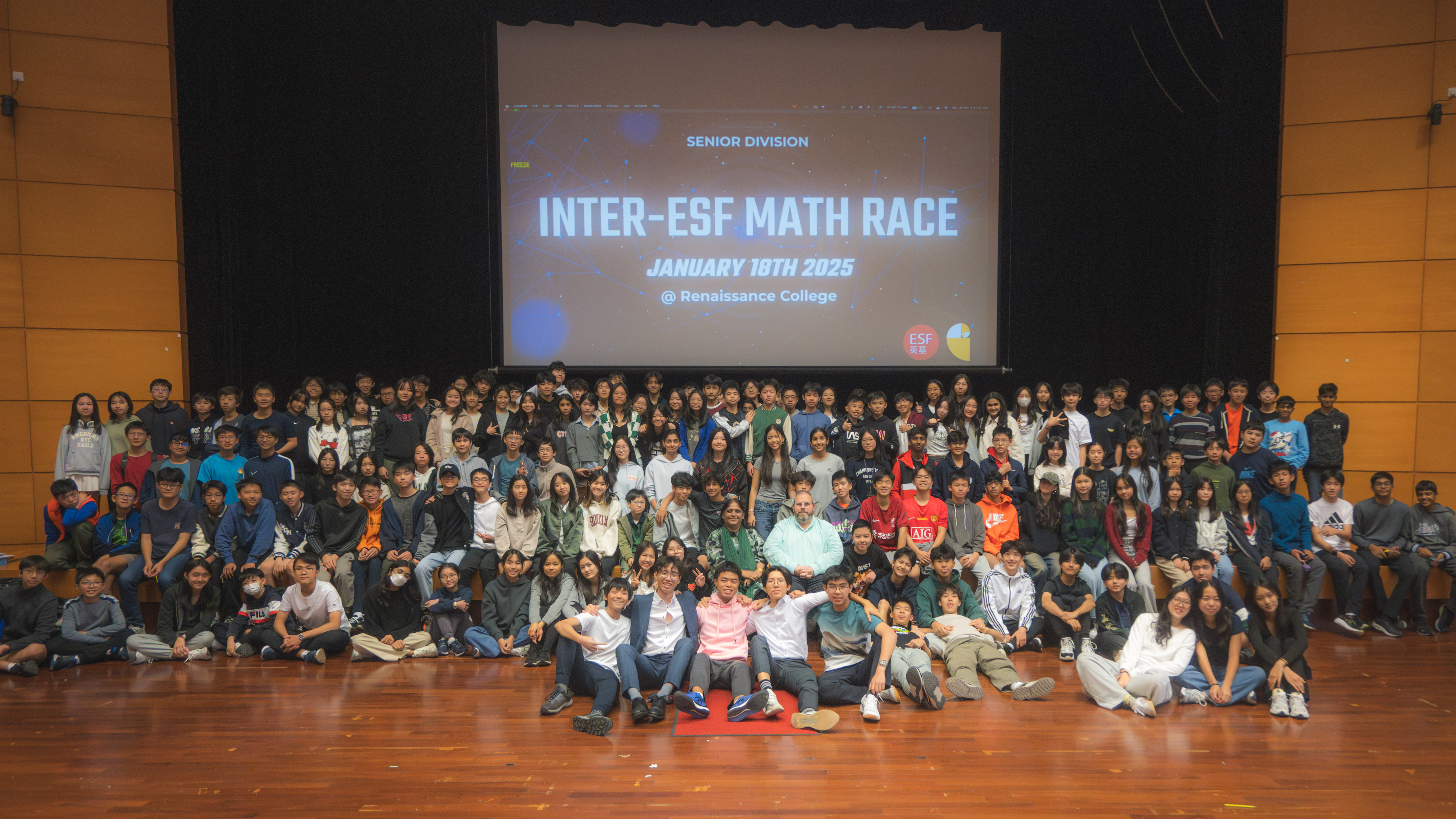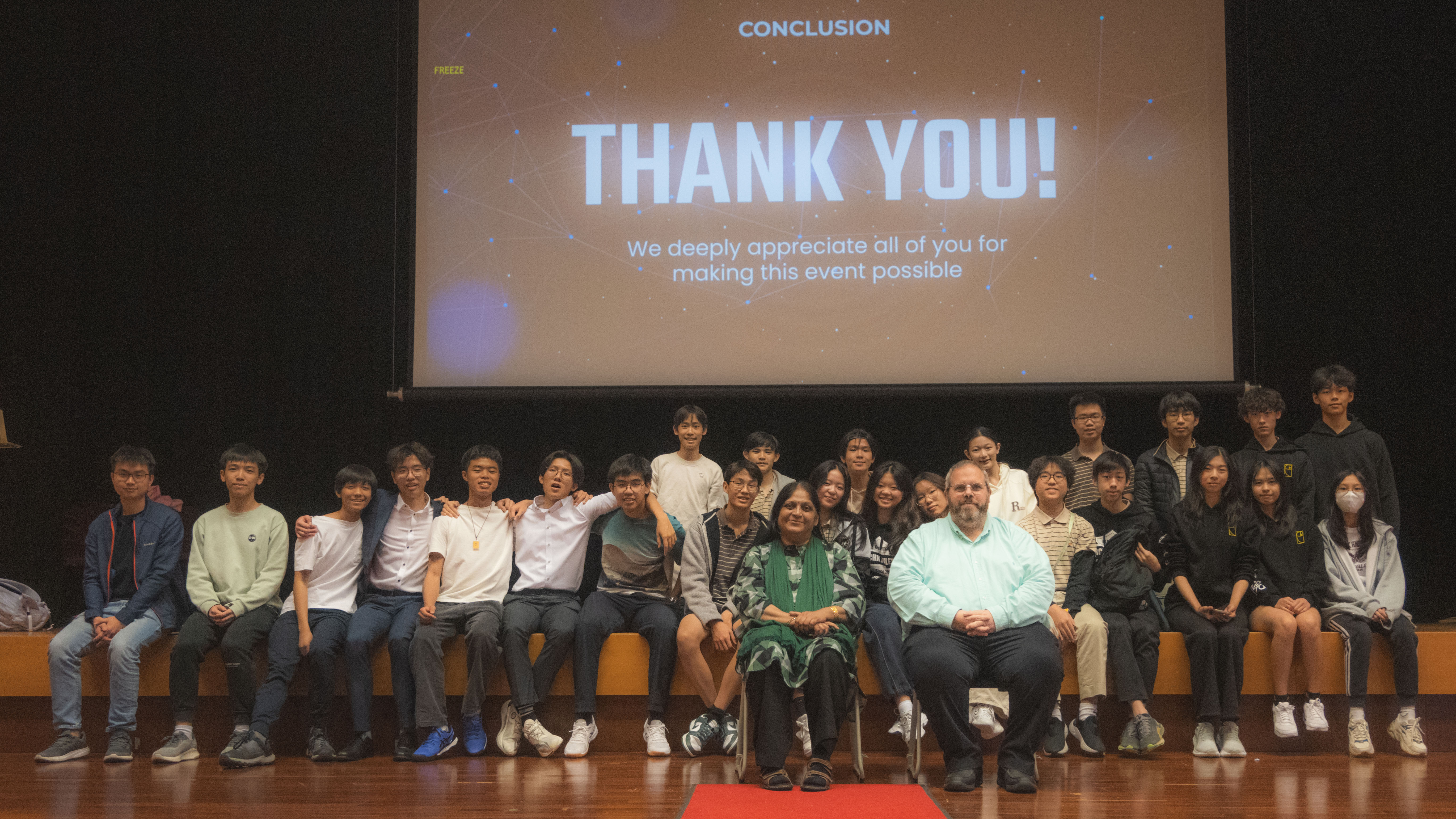Ryan's scholarship portfolio
Watch the videos as always! Switch between videos with the buttons at the top.
Watch the videos as always! Switch between videos with the buttons at the top.
Every year, I have the same problem: all the memorable videos are in portrait...
Over October break last year, I was on FaceTime with my old friend Tenor from Singapore. Our friend was hospitalised after a serious accident that paralyzed him waist-down and, as much as I wanted to visit, the most I could do was speak to him through Tenor's phone. Our friend went down in what was frankly a bizarre use of free will. Though I'm not going to share details, it's the type of situation where someone almost ruins their life over a stupid decision. We began discussing this concept of free will — how it can be used in constructive but also incredibly destructive ways. I saw free will as a terrifying prospect — if you've ever tried sitting on the edge of a building, you'd know the compulsive urge to fall off. But Tenor started talking about free will through another perspective — how he thought he'd changed his life by the same token. He's functionally a year above me — people in Singapore graduate in September (I think) so they sit around without school for almost a year. He got a 44 with pretty difficult subjects, founded an AI startup (ChatGPT wrapper of course, but still), and more. This really surprised me as I knew him as a not-great student who got expelled from three different schools. We also used to play a lot of Minecraft together over COVID, and I look at that era of my life as not necessarily one where I was surrounded with the best and brightest people. And I found out last week he got into Northwestern, USC and Georgia Tech. When I commented on how crazy it was that he managed to switch up and succeed, he said "You can honestly just do it — it's just free will. Like [our friend] but, positive." He gave me something I sort of always knew but never had distilled so clearly: free will is your biggest asset. This didn't necessarily change me, but it encapsulated me and who I aspire myself to be well. Just a couple weeks prior I changed my phone wallpaper to say "I can do all things" because I found it motivating — to get me to do things when I didn't feel like it. But it was only after my conversation with Tenor where I realised doing things was exactly how I had succeeded at things in the past. By "doing things", I mean that all of your success comes from a single source: the primitive act of doing. For example, you can optimize your gym routine or get a personal trainer but at the end of the day, progress is made only through pushing hard until failure. And by free will, I mean the agency that propels you to start "doing things". The first significant instance where I did this was applying for the scholarship in Year 9. My parents actually didn't know I had applied until I got the scholarship. I told them the check was for a field trip and wrote my dad's signature. I really don't know why I did that. But beyond this, I was not a great student — I had an MYP grade of 49 and barely any extracurricular activities. So as I told Ms Shen in my acceptance interview, "I just tried harder". In an extraordinary case of free will, I, in the span of 48 hours, went from playing Minecraft 6 hours a day to being fully focused on nothing but school and S&A projects just like the flip of a switch. I was so focused that I wrote 10,000 words on my Year 9 lab report — shout out to Athan and Oscar who I competed against for word count. And within the new year until a week before the application deadline, I started the public speaking club with Athan, the 3D printing club with Leo and Kendo, and the 3D animation and Rubik's cube clubs by myself. Only the 3D printing club exists by now but at the time they were successful. I'm just saying, this is what competing against Aidan, Lorraine and Leanne for supposedly "2 slots" will do to you.

To this day I'm still slightly curious about Ms Shen's reaction to me reporting a grade of 49 then finishing at 55. But nonetheless, this is where I started thinking: anything is possible. For this year? I could make a free will compilation of year 12, but I'd instead like to share an example that really shows the greatness of doing things. In June, Leo and I started @getfit_with_oscar on Instagram, later changed to @cardboard_academy_f1. We started making videos that I do not think had much meaning. (See this video for example.) It was just random stuff, posted for nothing more than the fun of posting. One day, my friends and I were at the charity bracelet sale run by Renee (I think). So just like any other person would, we tried to snap them with our biceps. I recorded Yannick, Adrian and Athan doing it, overlaid some 2020 TikTok dance song, and posted it. For the entirety of summer, it didn't get a lot of views. But one day in August, we found it at 70,000 views. The next day, 130,000. The day after, 1 million, and once it hit 5 million, it started getting around 200,000 views per hour. Now, it's sitting at 88.7 million views and 3.8 million likes — I'm fairly certain this is the most viewed piece of material from RCHK by a long shot. We never sought after views or likes or anything — all we did was post things, and we somehow became, as Leo put it, a "media tycoon" (hyperbole of course). I think this encapsulates the power of doing things: you can study the social media algorithm and all, but at the end of the day, all you need to do is post videos. It's ultimately the process that brings you to high places. Here's another thing: this seems really obvious, but I don't think people know how important it is. The best way to learn something is to just do it. For maths, you shouldn't go over your notes again; instead, do practice questions, and if you happen to not understand a question, go over your notes then. To learn programming, don't follow a tutorial: throw yourself into the deep end by starting a random project without any experience (e.g. a to-do list). This is guaranteed the fastest way to learn or practice the vast majority of things. So as I finish writing this, I'm immediately going back to doing math questions to prepare for the Hong Kong international math olympiad team qualifier on the 17th. You can just do things!
This question is a bit strange to me because I don't see myself fighting for one cause over my lifetime. I see myself fighting for many causes. My life, from when I became mature enough to care about issues in the world, has consisted of me — I don't want to say jumping between causes, but to crudely put it, it has been exactly that. I don't think it's a bad thing at all — a lot of things move me, and a lot of things should move you too. I suspect that people who don't feel the same are just sheltered from the outside world. The first issue I contributed to in any capacity was plastic pollution with the 3D printing club fundraiser. The next year of the fundraiser was to combat factory farms — after I read this article and Peter Singer's book. This year was for refugees in Hong Kong. And not to mention, last year on June 18, I co-organised in big part Humor IV, the first humor debate tournament ever, where participants had to make funny cases (that were actually very quite funny). Watch a round of the tournament here. All proceeds of the tournament went to relief in Gaza (over US$1500 I think). I still do feel immensely for the people in Gaza but especially at that moment last year, seeing the injustice of their situation, I chose to do this. (Humor IV does not feel like long ago — time is flying.) But more recently I've been encapsulated by an issue — not a global one of injustice, like the others — but a local problem that I think can be fixed. It's that we could be much more capable than we actually are — we could be learning so much more than we actually do. There are 4(?) specific areas I want to talk about here. First is programming websites. The upshot here is that coding a website is ridiculously easy. It's something I believe everyone can do and that everyone could easily learn how to do (e.g. in MYP Design). All it comes down to, is that websites are just boxes, inside boxes, inside boxes. I'm not sure how to explain it here but with just 5 minutes, I guarantee that I would teach you enough that you'd be able to code the interface of google.com. Check out this extension — click on the icon when you're on any website — if you're curious what I mean by boxes. All of this is with the help of an industry-standard tool called Tailwind CSS. I've seen this in action: in Year 11, Athan and I made our I&S assessment website with pure code. I taught him the controls and he immediately picked it up (and designed and coded the entire thing). It was incredibly intuitive and I'd say the website looks pretty good for someone who just started learning it. Even more recently, this year's RCHK JA company featured an entirely coded website by Anthony as well. I barely taught him anything. I just showed him how to install Tailwind and taught him a couple of the keywords. And their website was fully functional and looked quite nice as well! So, everyone can and should learn how to code a website. Sometime in the future I'd like to run a website-coding class — it'd take no more than one lunchtime. (When people say Computer Science graduates are unemployed, this is why, by the way.) The second area is learning languages. Two months after enrolling in French ab initio, I started doing reading and listening exercises on a 1191-slide long powerpoint. I ran out of slides last month but that's not the point. The point is that I've become pretty good at French while learning for the same amount of time as everyone else, and I can tie it all back to that comically long powerpoint. The upshot for this one is that the runaway favorite for most effective language-learning method is to use the language. Read, listen and write. It far surpasses learning vocabulary with a Quizlet or Anki set, Duolingo, or random worksheets. And I'm not sure people know this. In response to this, I built an AI language learning tool (still in development, so the link is a bit eccentric...) that generates reading, listening and writing exercises based on your specified vocabulary, level and grammar concepts you want to practice. I did this because I ran out of slides on my powerpoint but it's already been more effective just because you can specify the settings of your practice. Learning vocabulary with this is far more effective because you actually use it — you see it in sentences. One day I need to do a study on this because I genuinely believe it multiplies your language acquisition speed by at least 3 times. So this is number two: we could be so much better at French and Spanish just by doing this. The third thing is learning math, which is actually quite similar to learning languages. You learn best by doing math questions. But not just doing questions — doing questions that teach you something or expose you to a way of solving problems you wouldn't easily think of. Not doing easy Dr Frost Maths that you'll get bored of, but questions that challenge you. You need to attempt a difficult question you can't do, figure out how to do it, then get the opportunity to apply the same or similar solution/concept again. Like my introduction — learning by doing things — but there's a specific method to it. I've been subconsciously doing this for a long time which means that every time I have a math test at school, I'm almost just going off experience. In Year 11, I made my solution to this and finished around the start of this year. https://orchardapp.org/ is an app that re-generates practice questions. You can upload your worksheet and it will generate out the same questions conceptually, but with different numbers. This is because often, questions don't repeat so you never solidify knowledge. I'm still on my way with this but maybe one day, we can all be great at math as well. Last and least — this one is shorter — is economics. IB economics is really easy, and most people are capable of finishing the entire syllabus in one month, or at most two months. I have taught to multiple people half of the entire macroeconomics chapter in under 10 minutes. And Aidan will know the time I went to study economics with him and ran him through the entire microeconomics syllabus in less than an hour. Of course, when you're in a class environment with 20 other people, it dramatically slows down; you also have the problem of needing to stretch the content out over 2 years. These are separate issues, but I've been noticing a theme that we're capable of more than we actually sort out to be. This is an issue I'm currently passionate about because I think it's effective altruism. I've seen these problems in action and I know in some part how to solve them, so I'm more useful here than elsewhere. One time, Dr Brown told me that I'd make a great lawyer because I like fighting against what I believe is injustice (or because when I see something wrong I bring it up to him). I really do like to believe that. I don't like seeing things that aren't right and to the extent of my capacity I will always fight for not only justice, but to improve the world in any way that my set of skills allow me to.
This year, I stepped up to lead the Inter-ESF Math Race, with Ms Sanker and Athan. Last year, I was part of the supporting cast, which gave me the knowhow to run a successful event. Our biggest disappointment last year was not being able to do power pairing. Someone devised a system that ended up not working. So in June of last year, Athan and I ran a RCHK-only version of the race, where I tested my power-pairing system. It succeeded under that smaller environment and I was eager to try it in January at the Inter-ESF version. What I didn't expect this year was how little people would be involved in organisation. Preparing the competition was pretty much just Athan and I, with Oscar and Ethan helping a lot as well. It was quite a bizarre experience having my fingerprints over almost everything in the competition: Athan and I arranged all the rooms on the first, second third and fourth floor by ourselves before and after. I remember staying at school until 10 PM on the day before, arranging the PAC, fixing questions, and making the Buzzer round slideshows. On the same day was the ISSFHK Cross Country championships which I skipped — though I'm certain my legs wouldn't be nearly as tired if I had went instead of doing this. But the day itself was pretty nice. Apart from a Junior Buzzer round where the second round went poorly, causing a bit of unfairness and a task involving balancing weights that had incorrect answers, everything went smooth! And most importantly, my power-pairing worked — the one thing I really wanted to implement since far before I joined the organising team. As a former participant in the race, I was once victimised by the lack of power pairing as I had to face Athan and Oscar singlehandedly twice. Though I beat them both times, it was by smaller margins than other teams who faced the same bad team twice in a row, which meant I couldn't win. In my and Athan's Math Race, we had the two best teams face off — I had the privilege of watching and a team carried by an incredibly talented kid from Island School won. He was faster than I ever was but I really can't be jealous. Ms Sanker told me no one had ever gotten power pairing to work and that I shouldn't bother because it would just mess things up. Feels good to succeed! During the Dragon Math round, a 30-minute portion of the competition that involved running around to obtain questions and solving them, I put on some House music. After the round finished, this kid walked up to the PAC speaker crying, yelling "I hate the music" while attacking the speaker. Apparently he came to the competition to prove his worth as he didn't have many friends at school. As usual, 350+ participants from 7 ESF schools. One weird aspect about the Math Race that other events I've organised don't really have is that you need a *lot* of volunteers. For every two teams of three, you need one person to help, and the Math Race is a big event. Dividing the 350+ into junior and senior gives you 175, so you need 30 volunteers. A lot of people came out to help — which I'm really grateful for — you really can't understate the generosity of someone who takes the time out of their day to do something even though they don't get that much out of it.




I started the year in debate participating in the Senior Schools Debating Competition (SDC) with Oscar, Athan and Andrea. To me, this was where the year *really* started. Prior to this, the only activity I was involved in that was at least mildly-high-pressure, was the SAT: I didn't study for it and got a score of 1570, which is disappointing as I would have maxed it if I wasn't overly confident. This competition was great because it woke me up after an October break where I was mentally not in the right place, and also because I got to meet old friends from DC and Island School. We won the first three preliminary rounds against teams that weren't too bad, then we somehow beat HKIS in the final round to take second place in the preliminaries. This was phenomenal as we were typically not this strong, but any team with Andrea on it can always go places. And in my experience I knew how to win debate rounds in any specific situation. In the knockout rounds, we won in the quarterfinals, then faced HKIS again and lost in the semifinals. But I'm still pretty happy with the result. And I firmly believe if we made it to the finals we would have won against DGS. We'll be back next year for our final attempt and win Hong Kong's equivalent of Nationals for debate. This summer, Oscar and I will get back to doing lots of debate practice which will be exciting. After SDC, I trialed for the Hong Kong debate team again — this time, they actually let me trial. I went into a ridiculous focus mode in the two weeks leading up to it — I didn't do enough practice consistently over summer and in the month before the trial as I had planned, so in those weeks I did nothing but practice Prime Minister speeches. And it worked. I stopped pausing a ton and my stylistic clarity improved a lot, which had always eluded me. But I think by focusing so much on style, I forgot to warm myself up in terms of responses (counter arguments), which I think ended up in me getting denied a spot on the team. The trial also allowed 30 minutes to prepare the case as opposed to 15, and I wasn't used to it — I didn't do a lot with the extra 10 minutes I had, which was obviously really bad. Debate has always been really weird to me because I don't really know why I do it in the first place. I'm not particularly good at speaking — I used to have a crazy speech impediment — and I'm quite average at debate and public speaking. But I still do it and aim high, for reasons I'm yet to discover. But truthfully, my speech impediment has gotten way better in large part because of debate and despite not being talented at it, it's still been nice to try become really good at debating.
Leo left the school this year — he wasn't here to run the club with me, so I recruited Yannick, Adrian and welcomed Kendo back. This year, we based ourselves in the Red Door instead of Design: they were really welcoming, big thank you to Mr Sandford, Mr Kai and Mr Lowe for letting us in and supporting us. As usual, starting with our College Fair fundraiser, we planned, designed and printed products. The Red Door 3D printers are really nice: they print really well which allowed us to make a lot of cool thing like fidget toys. Those sold really well. Notably, we didn't get our college fair stall until very late. Instead of going through Mr Chaing, we contacted RAPT directly to get our stall, which solved the problem. On the day, however, I had a fever and had to leave mid-day. Still, our stall sold in excess of $3,000. This was way better than last year but importantly, it was the third year of the fundraiser which is a great milestone. I'll probably do the fourth year and then who knows what'll happen? But unlike previous years, we didn't stop after the fundraiser. Normally, the Design department doesn't like us using the 3D printers, so we'd politely excuse ourselves after December. But Red Door was different. Many of our club members designed really complicated models, and Mr Lowe kindly let us use the Resin 3D printer to print it. Finally, Yannick and I embarked on our project to print GDC cases and give them out to people. We made 10 different models to share to students who didn't have cases. Find us in the yearbook!

